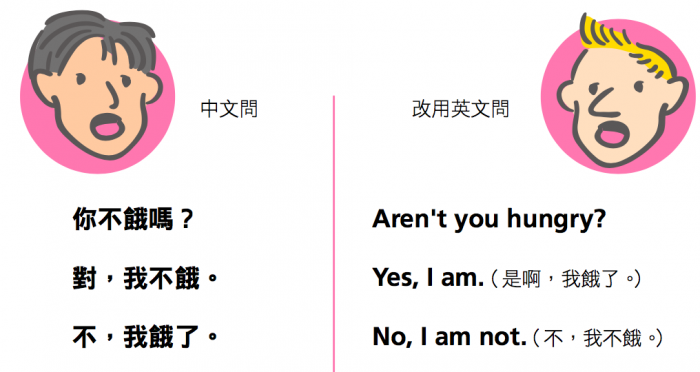中英文的「反問」,回答不一樣
有一種問法,叫做反問,中英文面對反問,回答的概念不一樣,怎麼回答才不會因為理解錯誤而造成誤會。

如果用英文回答:
(X) No, I am hungry.
(X) Yes, I am not hungry.
是錯的!
這是中文思考模式,老外聽到這種回答,會認為前後矛盾。英文就算是反問,看成一般的問句回答就好(Aren't you hungry=Are you hungry)
附加問句的反問,回答也是一樣,無論是 “is it? ” 或是 “isn't it? ” 都看成前者的問法回答:
Lisa is pregnant, isn't she?
Lisa 懷孕了,不是嗎?(用 is she pregnant 回答)
(X) No, she is.
(X) Yes, she isn't.
(O) No, she isn't. 不,她沒懷孕。
(O) Yes, she is. 對啊,她懷孕了。
不介意用 no,介意別說yes
另一個回答要特別注意的就是 Do you mind、would you mind 的問句,不介意可以說 no,但介意直說 yes, I do mind.(恩,我介意),就是帶有不悅的意味,視情況表達。
Do you mind if I sit here? 你介意我坐在這嗎?
Not at all. 不,請坐。
No problem. 當然沒問題。
Sorry. This seat is taken. 不好意思,這位子有人坐了。
Sorry. I'm waiting for someone. 不好意思,但我在等人。
面對無理的問題 ,I do mind 就是強硬表態「我很介意、如果這麼做我會生氣」。
Do you mind if I check your bank account? 你介意我查看你的銀行戶頭嗎?
I do mind. 我很介意。
Do you mind if I ask your age? 介意我問你的年齡嗎?
I do mind. 我很介意。
本文摘錄自一張圖搞懂 Design a Better City 2018年11月號
訂閱雜誌
